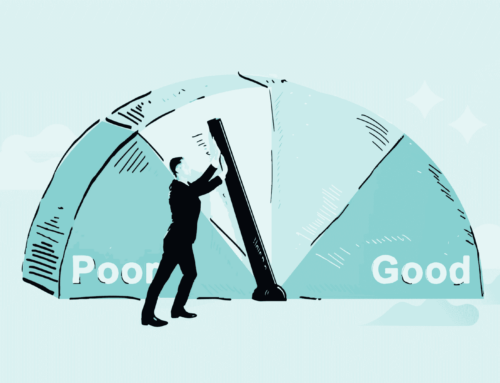To learn more about Why Your Credit Score Differs Depending On Where You Check It? You can enroll in our Maestro Financial Education Course here.
Why Is Your Credit Score So Important?
Your credit score is a three-digit number, ranging between 300-900, that determines how well you manage credit. In other words, your credit score provides insight to potential lenders on how likely you are to repay future debt. This number is a deciding factor on whether your lenders will approve you for a loan, how much interest you will pay, and how much credit you will obtain. Your credit score is calculated from the information reported to the major credit bureaus, from your credit reports. The lower your credit score, the more difficult it is to obtain credit.
In addition, you’ll pay more in interest, which increases your likelihood of defaulting on payments and getting caught in a cycle of re-borrowing. For this reason, millions of Canadians search online every day for services that will allow them to perform a free credit score and discover ways they can improve it. The benefits of a good credit score are endless. Most importantly, a good credit score will ensure that you qualify for the best rates on financing. There are many websites that will provide you with access to your free credit score, which is generally pulled from the major credit bureaus in Canada, TransUnion & Equifax. Since your credit score is calculated using different credit scoring models created by the major credit bureaus, each website you check your credit score on may be using a different scoring model too.
Why is my credit score different on different websites?
The factors used to calculate your credit score includes payment history, length of credit history, credit card utilization and derogatory marks on your credit reports. However, the major credit bureaus weigh each of these factors differently, depending on the credit scoring model that the credit bureaus are using. Therefore, your credit score varies, because there are many ways to calculate a credit score. Then, when you obtain a free credit scoring service, the different websites may be using any of these different credit scoring models. Sometimes, there could be a 100-point difference between scores, so which one is correct?
“My credit score varies depending on where I check my score”
It was found among many Canadian users, that their credit score was inconsistent across both free online credit score software and when comparing with TransUnion vs Equifax. Generally, free credit check software purchases your credit score from either TransUnion or Equifax. However, many users have reported their credit score has varied across them all.
Credit scores need credit data in order to provide you with a score. They need something to base their calculations on. Your credit report is different from your credit score, even though they are linked. A credit report is a list of the data the credit bureau producing that report has compiled for that person. So, each reporting agency may have slightly different data and use a different scoring model, which explains why our credit score differs.
Some credit scores determine your likelihood of defaulting on payments, while others determine your likelihood of filing for bankruptcy. In fact, between Equifax and TransUnion, there are over 25 different scoring models. So, no one credit score is the correct one, as they all measure different factors. Likewise, a lender may choose to use one scoring model over another. This is because lenders feel it more accurately determines the risk involved in extending credit to its potential clients.
‘Soft’ vs. ‘hard’ credit check
It’s important to understand the difference between a ‘soft’ and ‘hard’ credit check, and the effect that each one has on your credit. A soft pull is when you check your own credit or give permission to a potential lender to review your credit report as part of a background check. This type of inquiry is common among websites where you may check your credit score for free. Because soft inquires do not result in credit being extended, they have no effect on your credit score. By contract, a hard pull is performed when you do apply for credit, such as a mortgage, auto loan or credit card, so it can affect your credit score. If you perform too many hard inquiries in a short period of time, it could lead lenders and credit card issuers to consider you a higher-risk consumer, as it may suggest you’re short on cash or preparing to rack up debt that you won’t be able to repay.
“How do I tell if my credit score is accurate?”
We all understand that credit scoring is a complicated system. Sometimes it feels out of our control when we’re given multiple credit scores and unsure of which one to focus on. The one thing you do have control over is how you’re managing your finances, which will ultimately improve your score. The key is to regularly monitor your credit, maintain the proper utilization of all credit accounts and maintain an effective budget.
According to Hoyes, the insolvency expert, it is suggested that instead of focusing on your credit score alone, a better approach to monitoring your financial status would be to shift your attention to your credit report and ensuring its accuracy. Roughly 80% of Canadian consumers have reported an error or omission on their credit report. Meanwhile, this could be costing them unnecessary credit points. Above all, it’s important to regularly check your credit report to ensure its accuracy.
Hoyes also mentioned that it’s important to focus on your financial health as a whole and not necessarily what is best for potential lenders. Paying off debt and saving some of your income each month can be better for your financial health and over time, improve your credit score. If you generally have good spending habits and pay off your credit card debt on time you should see a natural boost in your credit score.
Learn More With Our Free Online Courses
Our Maestro Financial Literacy Platform allows you to enroll in over 25 different modules for free, to help you improve your financial fitness. This includes courses in credit scores and reports, budgeting and debt management. If you’d like to begin your journey today to a better financial future, check out our Maestro courses here.
To learn more about Why Your Credit Score Differs Depending On Where You Check It? You can enroll in our Maestro Financial Education Course below.
Why Your Credit Score Differs Depending Where You Check It
Your credit score is an important aspect of your financial life. But you’ve probably noticed, that your score varies depending on where you check it. Let’s learn why, and how TransUnion and Equifax play a role in this. Find out more at learn.mymarble.ca.






